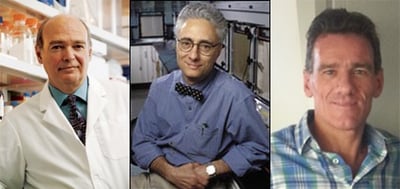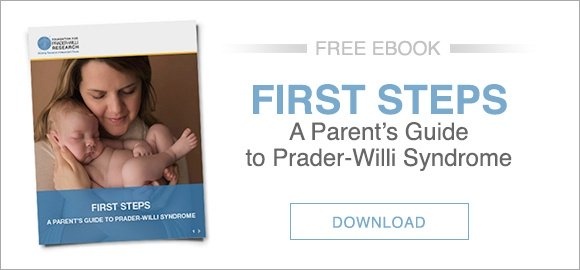 All individuals are born with two copies of chromosome 15: one copy comes from the mother, the other the father. In the case of Prader-Willi syndrome, the paternal copy is missing a portion of the chromosome (deletion), or is gone altogether(UPD), but the maternal chromosome (in both deletion and UPD subtypes) is present and intact. Through genetic therapy, we may be able to reactivate the maternal chromosome (which is typically silenced) or replace the missing information on the paternal chromosome.
All individuals are born with two copies of chromosome 15: one copy comes from the mother, the other the father. In the case of Prader-Willi syndrome, the paternal copy is missing a portion of the chromosome (deletion), or is gone altogether(UPD), but the maternal chromosome (in both deletion and UPD subtypes) is present and intact. Through genetic therapy, we may be able to reactivate the maternal chromosome (which is typically silenced) or replace the missing information on the paternal chromosome.
While genetic therapy is a long-term investment, it has the potential to address the root cause of PWS and possibly reverse the symptoms of PWS. FPWR is currently funding several researchers with projects related to reactivation of the PWS region on the maternal chromosome (that all patients with PWS have). These projects each explore a different approach to the question of whether genetic therapy can be used to effectively treat PWS.
This October, at the annual FPWR conference, 3 leaders in the field of PWS research, Drs. Lalande, Leibel and Nichols, will be presenting on their exciting work to reactivate the genes located on the PWS region of chromosome 15 (Lalande and Nicholls) and identify new targets for therapy (Leibel).Over the last several years, Dr. Marc Lalande’s research at the University of Connecticut has been a key part of the FPWR research program. In 2014, the Lalande lab created the world’s first PWS stem cells from skin cells of individuals with PWS, then used them to generate PWS neurons. Recently, Dr. Lalande has identified a protein called ZNF274 that plays a role in genomic imprinting (genomic imprinting is responsible for the PWS region on the maternal chromosome being silenced). His group has demonstrated that disrupting ZNF274 in PWS stem cells causes reactivation of the PWS genes on the maternal chromosome. They are now developing advanced methods of disrupting ZNF274 to more efficiently reactivate the maternally-derived PWS region genes. The Lalande lab is also developing novel techniques to grow PWS neurons in 3 dimensions, which allows them to better understand whether the cells are interacting normally.
Dr. Rudy Leibel, first began his work with PWS stem cells in 2012 when he used stem cell techniques to create hypothalamic brain cells to explore how the hypothalamus is altered in PWS. Dr. Leibel's group was the first to be able to generate hypothalamic neurons in the lab, and this FPWR-supported work was a major breakthrough in the field. Since then, Dr. Leibel's group has been investigating PWS hypothalamic neurons to understand how they function differently from typical neurons. This work has led the group to a new understanding of the fundamental disruptions in PWS neurons, and lays the groundwork for exploiting new therapeutic targets that might correct these disruptions.
CRISPR technology is revolutionizing scientists' ability to edit genes. The technology is also being adapted to turn genes on or off - which is what we need for PWS (our goal is to activate the silent maternal genes on chromosome 15). In 2015 FPWR funded Dr. Rob Nicholls, at the University of Pittsburgh, to develop this approach for PWS. Dr. Nicholls is using cutting edge CRISPR technology to evaluate the feasibility of activating the silenced genes with the long-term goal of the developing of a new genetic therapeutic approach for the major clinical problems for people with PWS.
We look forward to learning more about the progress each of these experts are making in their work to advance PWS genetics and reactivate the silent genes on chromosome 15. We hope you will join us October 28-30th in Providence, RI to learn more from these speakers at our annual conference! Learn more about our conference and register today!








